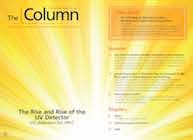Chris Pohl Receives EAS Award for Outstanding Achievements in Separation Science
The EAS Award for Outstanding Achievements in Separation Science was awarded to Christopher Pohl at EAS on 12 November.
The EAS Award for Outstanding Achievements in Separation Science was awarded to Christopher Pohl at EAS on 12 November. Pohl is the vice president of chromatography chemistry in the chromatography and mass spectrometry division of Thermo Fisher Scientific. Prior to the acquisition of Dionex Corporation by Thermo Fisher Scientific in 2011, Pohl was the senior vice president of research and development and the chief science officer at Dionex. Prior to joining Dionex, Pohl worked at the Clorox Technical Center and at Chevron Chemical. Pohl is the author or co-author of five book chapters and more than 100 scientific papers published in peer-reviewed scientific journals. He is an author or co-author of 85 U.S. patents with numerous foreign equivalents in a number of areas including separation methods, stationary phase design, suppressor technology, solidâphase extraction, capillary electrophoresis techniques, and accelerated solvent extraction (ASE). Pohl’s most significant accomplishments include the initial development of high pH anionâexchange chromatography for the separation of carbohydrates via anion exchange, the development of hydroxideâselective phases suitable for gradient ion chromatography applications, the development of membrane suppressor technology, the development of ASE, where he was the primary inventor, and the development of hyperbranched anionâexchange condensation polymer synthesis technology.
www.thermofisher.com/uk/en/home.html

Regulatory Deadlines and Supply Chain Challenges Take Center Stage in Nitrosamine Discussion
April 10th 2025During an LCGC International peer exchange, Aloka Srinivasan, Mayank Bhanti, and Amber Burch discussed the regulatory deadlines and supply chain challenges that come with nitrosamine analysis.









